Not lovin’ it
McDonald’s across the country were hit by COVID-19 outbreaks as hundreds of complaints alleged safety breakdowns.
By Lance Williams | January 15, 2021
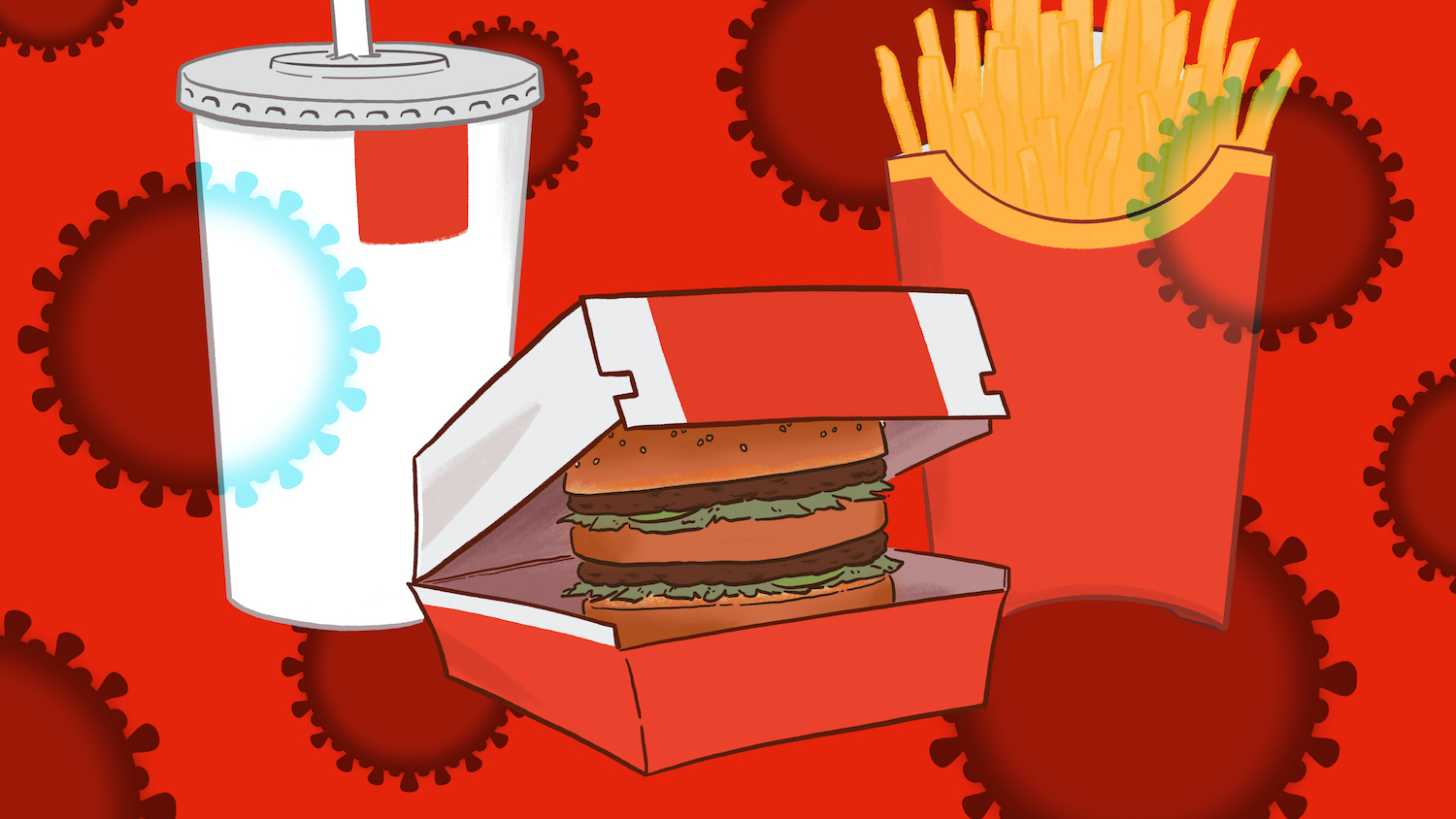
This story was co-published by the Los Angeles Times.
In the crowded kitchen of a McDonald’s outlet on a working-class commercial stretch of Oakland, California, it was as though the coronavirus didn’t exist.
Social distancing wasn’t enforced in the early weeks of the pandemic, workers at the Telegraph Avenue store claimed: As they boxed Big Macs, scooped french fries and bagged orders, they often stood shoulder to shoulder.
There weren’t enough masks, so managers told workers to improvise, offering up a box of dog diapers somebody had left at the store. Often, the outlet was so busy that workers said they had no time to wash their hands, let alone disinfect the countertops.
The outlet’s coronavirus information poster was of little help: It was printed in English, and most of the roughly 40 workers spoke Spanish.
When the coronavirus surged through the store in May, employees – even those with symptoms – said they were pressured to keep working, according to formal complaints filed with the local health department and the state Division of Occupational Safety and Health.
“The managers at McDonald’s have known for weeks that workers at our restaurant were getting sick with COVID-19 and that the rest of us were being exposed,” wrote cashier Angely Rodriguez Lambert, 26. “But they did not tell us.”
McDonald’s was her first paying job since she arrived from Honduras in 2018, settling in Oakland with her aunt, uncle and grandmother. During an 80-hour workweek at the short-staffed restaurant, she told Reveal from The Center for Investigative Reporting, she began suffering chest pains and a raging fever.
“There were times I thought to myself, I’m not going to work anymore, it’s too risky,” she said. “But I had to get paid to help my family.”
Among the next to succumb was cashier Yamile Osoy, 26. On May 18, she developed COVID-19 symptoms – a fever, head and body aches – but continued working because she couldn’t afford not to.
As her symptoms worsened, she told her shift manager that she felt sick and wanted to go home. According to her complaint, he told her to lower her mask so she could breathe easier – and finish her shift.
Several days later, her partner, infant and 8-year-old son began to experience COVID-19 symptoms. The 10-month-old went into convulsions when his fever spiked to 104 degrees. Then Osoy’s COVID-19 test came back positive.
“I just kept thinking, what’s going to happen to us?” she said in an interview. “Especially my son. He’s so small, he couldn’t tell us how he felt.” For him, the disease lingered, appearing to dissipate, only to return with a fresh fever and diarrhea six weeks later.
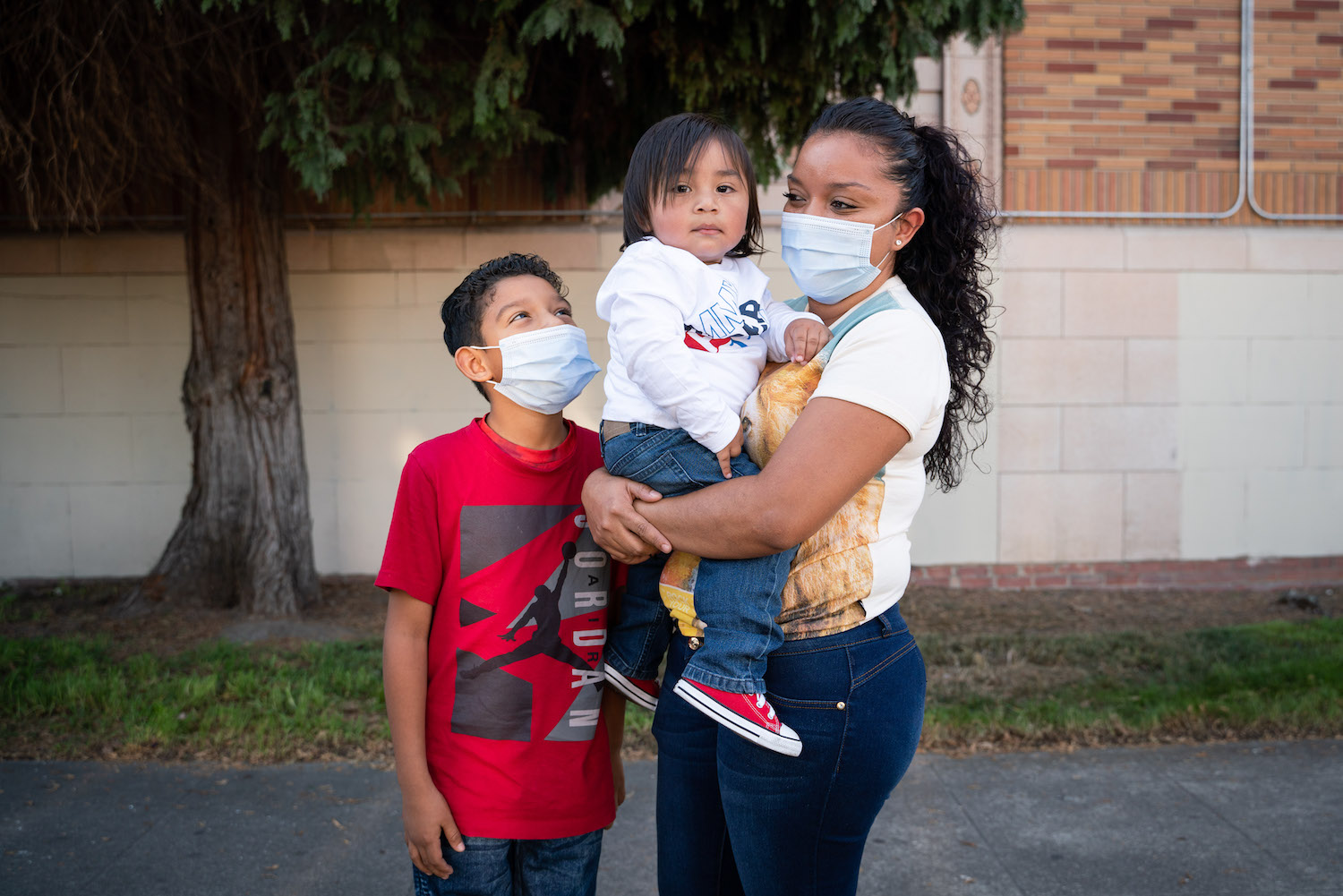
Two days after Osoy fell ill, her co-worker Maria Orozco, 28, received an alarming phone call at work: Her kids’ babysitter had COVID-19. Orozco had been working alongside a store manager who had come into work with flu symptoms. Convinced she had carried the virus to her sitter, Orozco burst into tears. She later tested positive for COVID-19, as did her two children and her brother, also an employee of the Telegraph Avenue McDonald’s. Ultimately, at least 20 people associated with the outlet tested positive for the coronavirus or experienced symptoms, according to complaints.
Emboldened by organizers from the Service Employees International Union, 20 workers walked off the job May 26, forcing the store to shut down. An Oakland judge imposed strict conditions for the outlet to reopen.
The store’s operator, Michael Smith, did not respond to specific allegations. In a written statement, he said that he had gone to great lengths to keep his workers safe during the pandemic, spending thousands of dollars to purchase protective gear and imposing “rigorous” safety procedures. “Our people are the heart and soul of my organization,” he wrote.
By summer, the coronavirus had flared at nine other McDonald’s outlets within 15 miles of the Telegraph Avenue store, including three operated by Smith, with more than 70 workers and their families testing positive or exhibiting symptoms, complaints show.
It’s a pattern that has repeated itself across the country.
Safety complaints in dozens of states
McDonald’s USA, the nation’s largest fast food restaurant chain with 14,000 stores, has claimed it’s an industry leader when it comes to COVID-19 precautions.
The company said it has imposed more than 50 enhanced safety procedures to guard against COVID-19 in its restaurants and has engaged the Mayo Clinic for advice on how to “further enhance hygiene and cleanliness practices in support of customer and crew safety.”
But complaints filed by McDonald’s employees in 37 states portray some of the chain’s outlets, both franchises and corporate owned, as COVID-19 incubators: at their worst, crowded workplaces with inadequate protective gear and safety procedures.
As in Oakland, employees around the nation said they were pressured to work in close quarters alongside ill co-workers or come to work when they were ill themselves. Even when cases of COVID-19 appeared among staff, outlets remained open for business, according to the complaints, which were filed with state and federal regulators from March through Dec. 13.
Restaurant cleaning was haphazard after cases were detected, and masks and gloves were in short supply, according to complaints. Sick pay and quarantine pay were not available in some stores and given grudgingly in others, workers claimed.
As staffing levels fell in stores where COVID-19 had taken hold, employees filed complaints saying they were pressured to work double shifts or cover shifts at other outlets experiencing outbreaks.
McDonald’s executives maintain that the vast majority of its outlets are clean and safe.
Bill Garrett, who heads the company’s coronavirus task force, said he knew of only “a few isolated instances” in which the coronavirus had been an issue at McDonald’s franchises.
“What I can tell you is we’re watching things very, very closely and we’re not seeing any type of large or widespread problem that we would react to,” he said in November.
In U.S. cities, McDonald’s employees typically earn about $15 an hour, according to the SEIU, which is seeking to unionize the fast food industry. Many of those who filed complaints said they felt compelled to work even when sick or risk having their hours cut or losing their jobs entirely.
As Walter Cortez, a worker at a McDonald’s in San Pablo, California, wrote, “The managers say, ‘Aguántate,’ ” – put up with it – “because there is no one to cover your shift.”
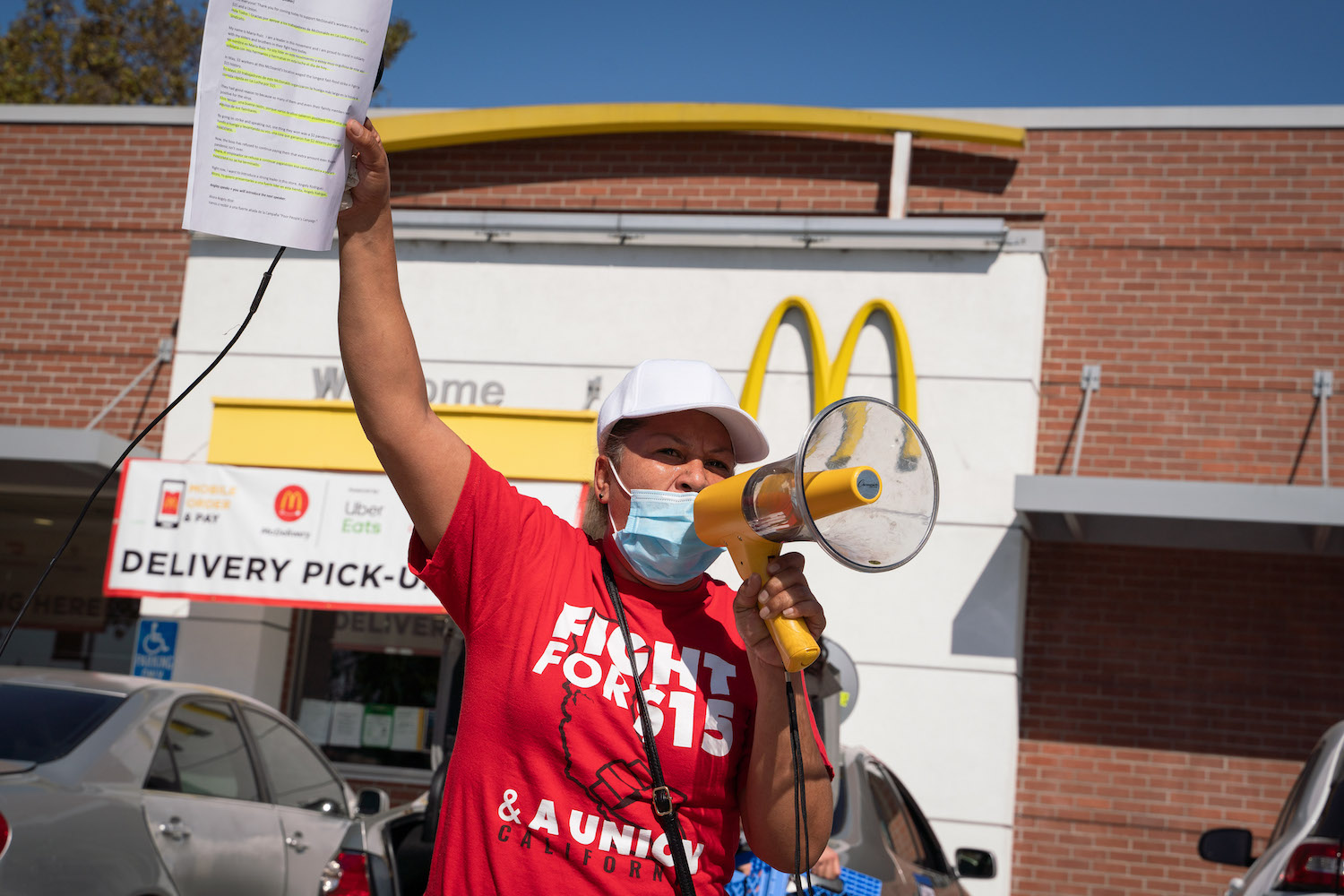
Reveal reviewed summaries of more than 1,600 complaints to the Occupational Safety and Health Administration concerning the coronavirus in the nation’s fast food restaurants, along with 200 additional accounts found in health department records, lawsuits and news reports.
Altogether, Reveal identified more than 230 McDonald’s outlets from Maine to Hawaii that had been the subject of county, state or federal coronavirus complaints and health department reports. Nationwide, the virus has flared at about 140 of these outlets, and nearly 500 workers and family members have fallen ill, according to the complaints and health reports. Dozens of franchise owners have self-reported additional cases among their employees.
That’s a tiny percentage of U.S. McDonald’s outlets. But the number of COVID-19 cases at McDonald’s is likely far higher than available information shows. Only three state health departments – Colorado, New Mexico and Oregon – publish data identifying businesses where workers have been infected with the coronavirus. All three recorded McDonald’s outbreaks, including one in eastern Oregon in which 40 people associated with two McDonald’s outlets near Hermiston became infected in July.
Blake Casper, owner of 63 McDonald’s franchises in Florida, said in an interview that about 100 of his 3,500 workers had become ill with COVID-19 so far, cases that do not appear in OSHA complaints or public state health department data. Casper, who is also chairman of the National Owners Association, a franchisees group, contended that only one of those workers had gotten ill at work, citing contact tracing by his HR department.
Franchisees like Casper run almost all the nation’s outlets. These independent owners pay rent and a cut of sales to McDonald’s USA but set workers’ pay and benefits themselves. Casper said they have borne much of the financial cost of responding to the pandemic.
“We all got surprised – shocked – when this thing came barreling down in early March,” Casper said. Franchisees scrambled to buy protective gear and establish safety procedures, he said. They got guidance from corporate headquarters, he said, and McDonald’s used its massive buying power to secure special prices on protective gear.
“We’re paying for it, but they sourced it,” Casper said. “But that’s life.”
SEIU officials said McDonald’s workforce has been deeply worried about contracting COVID-19 on the job. In a union survey from April, more than 90% of respondents said they had trouble getting masks, and 1 in 5 reported working while ill, either because they lacked paid sick leave or were afraid of being penalized for not showing up. The union also points to strikes over COVID-19 safety that have shut down more than 100 McDonald’s outlets in 20 cities, including Los Angeles, Chicago and Oakland. The company has dismissed the strikes as publicity stunts.

Few fast food inspections
Regulators have been slow to intervene.
So far, only three fast food outlets in the U.S. have been cited for an OSHA violation in connection with a coronavirus-related complaint: a pie shop in Washington, a waffle house in Minnesota and an Arby’s in Oregon. The pie shop faces a $2,700 penalty for unspecified violations, records show.
On-site investigations have been rare. In response to those 1,600 COVID-19 complaints, inspectors have visited only 56 fast food outlets so far, according to OSHA records.
Nearly 600 cases are open.
But authorities closed about 1,000 cases without an inspection, records show. Instead of visiting stores and interviewing workers, inspectors sent letters to owners. Some OSHA inspectors invited store managers to investigate complaints themselves and report back.
“OSHA investigates every complaint, whether it is received as a formal or informal complaint, or whistleblower complaint,” a Department of Labor spokesperson wrote in an email. He did not comment on the low number of citations.
Local health officials, who have authority to enforce COVID-19 safety measures, have often failed to pick up the slack.
The county inspector responsible for the Telegraph Avenue McDonald’s was assigned to monitor health and safety compliance at “nearly 300 other facilities,” including several with COVID-19 outbreaks, she wrote in an email to the outlet’s owner. And when she finally made an inspection, she went to the kitchen and began checking the temperature of the meat – a routine food safety procedure.
The inspector did not talk to workers, according to attorney B.J. Chisholm, who represents employees in a lawsuit against the outlet’s owner. On the report, the inspector wrote, “All covid requirements are in place.”
Spokesperson Neetu Balram wrote that the Alameda County health department “does its best to distribute work evenly among all staff, which has increased due to impacts of the pandemic.”
The dominant player
COVID-19 flare-ups have occurred at multiple fast food chains.
In March, Chipotle outlets in New York City were roiled by four worker strikes over coronavirus concerns. In June, 10 employees of a Chick-fil-A near Kansas City fell ill with COVID-19. In July, an employee of a Santa Monica Burger King died after working for a week while sick with a cough and other COVID-19 symptoms, according to a complaint, sparking a walkout.
But McDonald’s is the dominant player in the U.S. fast food industry, and the company has accumulated many more COVID-19 complaints than other chains. Of 1,000 fast food industry complaints in which OSHA identified the company name, 151 concerned McDonald’s. (OSHA doesn’t disclose the targets of open complaints.) Subway, which ranked second, garnered 40 complaints.
Before the coronavirus, McDonald’s had over $38 billion in annual sales in the U.S. The pandemic hit the company and its franchisees hard early on, as sales dropped by more than 20% before starting to rebound.
As the pandemic unfolded, McDonald’s USA ordered franchisees to comply with a long list of safety measures: They were required to enforce social distancing, provide adequate protective gear and ensure that cleaning procedures were followed, according to Garrett, the executive in charge.
McDonald’s USA also pushed franchisees to offer paid sick leave to workers during the pandemic. But franchisees pushed back, saying they were “losing faith” in management because the company wasn’t providing the financial relief they needed.
McDonald’s USA backed away from the sick pay issue. But David Tovar, a company spokesperson, says he is confident that McDonald’s workers can get paid sick leave during the crisis – either from franchisees or through provisions of the federal Families First Coronavirus Response Act and local laws.
Meanwhile, the company says it has aided its franchisees by deferring hundreds of millions of dollars in rent and royalty payments and by pumping $100 million into marketing.
Many franchisees also have gotten help from federal Paycheck Protection Program loans, a feature of the CARES Act.
Operators of at least 70 McDonald’s outlets facing coronavirus complaints got the loans, collectively borrowing at least $50 million, according to Small Business Administration data. Among them was the corporation that owns the Telegraph Avenue store in Oakland, which borrowed at least $1 million in potentially forgivable loans. The money is intended to help businesses pay their workers.
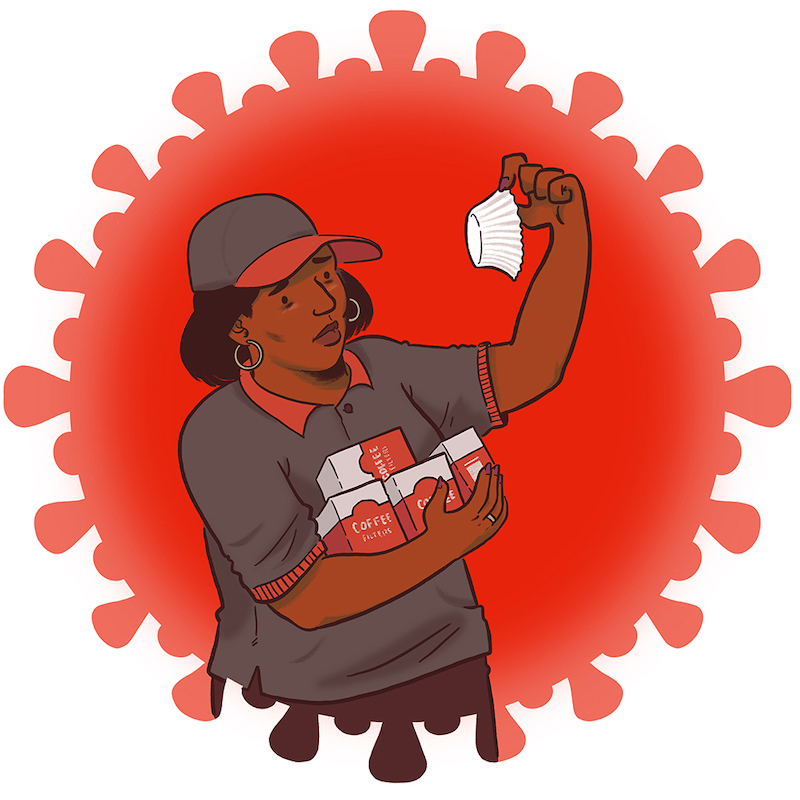
Feverish employees told to work
The majority of the McDonald’s complaints reviewed by Reveal warned that shoddy practices might bring on an outbreak, including 129 complaints about inadequate masks or gloves.
In Palmdale, California, workers were getting “one disposable mask per month” in April, while in Indianapolis, workers said they weren’t provided masks at all. That same month, workers at an outlet on San Francisco’s Fillmore Street said that when masks ran low, they were told to make their own: not out of dog diapers, as in Oakland, but from coffee filters.
Even when masks were available, complaints show, they were not always properly used. In Delaware, Ohio, a McDonald’s customer told OSHA in May that workers’ masks were “hanging at their chins.”
Nor was social distancing possible, 40 employees claimed. “The kitchen is very small,” said a worker in Valencia, California. “When it is busy, the workers are basically touching each other.”
More than 100 complaints, spread across nearly 60 towns and cities, accused McDonald’s of botching its response to a known COVID-19 case, either by failing to shut down for a proper cleaning or neglecting to get exposed workers into quarantine. Some of the complaints date back to the chaotic early weeks of the pandemic, but many of the complaints date from late summer or fall, after stores had time to solidify safety protocols.
In Darien, Connecticut, McDonald’s assured the local health department that after a worker tested positive, the outlet had been shut down for an intensive disinfection, records show. But in a complaint co-signed in May by the ill worker, Emma Vasquez, employees said the only “deep cleaning” was done by a single worker while the store remained open.
“My employer gave your department false statements,” Vasquez wrote.
Often, workers complained that they weren’t informed when COVID-19 hit their workplace. An employee at a Chicago outlet said she learned a co-worker had tested positive from a Facebook post. Managers kept things under wraps to avoid ordering quarantines, complainants claimed.
In dozens of other complaints, as recently as November, McDonald’s staff said they found themselves working alongside employees with obvious flu-like symptoms, records show. As a worker in Jasper, Tennessee, complained in July, “Several employees are sick with fevers and are being told to continue to work.”
Some employees reported that paid sick leave was discouraged or unavailable, so they worked even when they knew they shouldn’t.
“Three people in my house tested positive,” Rosa Contreras, a worker in Ontario, California, who lived with other McDonald’s employees, wrote in May. “But still I went to work one more day because I needed the money.” She said she later tested positive herself.
Some workers said they were required to enforce COVID-19 safety rules, forcing them into conflict with customers.
In May, an irate customer in Oklahoma City shot and wounded three workers after being told an outlet’s dining area was closed because of the pandemic. In June in Oakland, a 19-year-old cashier described being punched and slapped by a customer after she told him to wear a mask. In July, a Chicago customer who was admonished to wear a mask attacked a worker, slapping her and pulling her hair as bystanders videotaped the altercation.
“Every day, when I tell customers, ‘Please wear the mask properly,’ customers call me a ‘fucking bitch,’ ‘a fucking Mexican whore’ and say, ‘Go back to your country,’ ” wrote Alejandra Mendez, a worker at a Santa Monica McDonald’s where three employees contracted COVID-19. “Our managers do not do anything and just allow this to happen.”
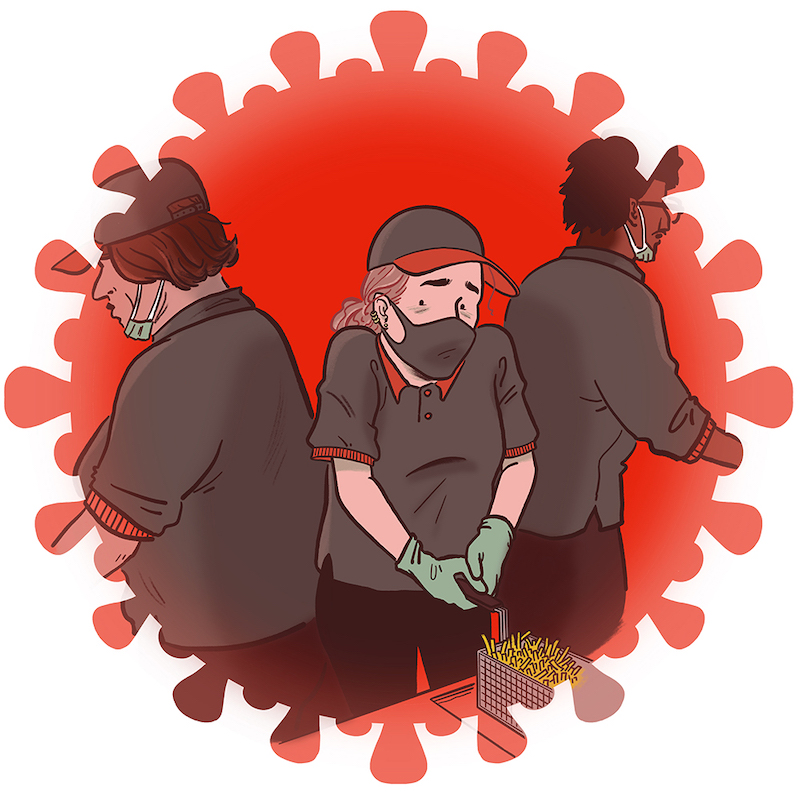
A viral spread
After the May outbreak at Oakland’s Telegraph Avenue outlet, the coronavirus moved to another McDonald’s outlet three miles away in Berkeley, near the University of California campus.
According to complaints that the store owner called false, a manager who had worked while ill at the Oakland store also had pulled shifts in Berkeley. There, she confided that she was in pain and needed medication for a fever, complaints claim.
Soon, workers in Berkeley learned the manager had tested positive. For a time, they said, workers received temperature screenings, but the practice was abandoned when the thermometer broke.
Employees who had worked alongside the ill manager – even those experiencing COVID-19 symptoms or awaiting test results – were pressured to stay on the job, according to complaints.
By the end of June, more than 20 Berkeley workers and family members were ill with COVID-19.
The baby was “terribly sick and losing weight,” wrote the child’s aunt, Jennifer Escobar, who also worked at the store and tested positive. “I am in shock that this is happening to my family.”
Among the ill: two workers who, like the manager, had been pulling shifts at both stores.
Meanwhile, a worker from the Oakland store on Telegraph also was covering shifts at a McDonald’s 15 miles away in the city of San Pablo. Although that worker never tested positive, the coronavirus whipped through that outlet as well: Three employees tested positive for COVID-19, according to complaints, and eight others were symptomatic.
By summer, the coronavirus had broken out at two other McDonald’s outlets in Oakland and a third one 15 miles south in the city of Hayward.
The coronavirus also appeared at an outlet in El Cerrito, six miles from the Berkeley store and owned by the same company. Employee Daniela Rodriguez said in a complaint that the El Cerrito store was short-staffed because one employee had tested positive and seven others were afraid to come to work.
On a weekend in June, a Berkeley manager sent a text to all scheduled workers ordering them, on penalty of discipline or termination, to report to the El Cerrito store instead. The text didn’t mention COVID-19. According to SEIU, two workers who said they reported to El Cerrito later tested positive for COVID-19.
The workers’ claims are false, said Larry Kamer, spokesperson for store owner Pavilions Management. In an email, he wrote that the Berkeley health department had inspected the store and taken no action. The company’s “careful, consistent, and effective actions” had kept customers and workers safe during the pandemic, he wrote.
Similar multistore outbreaks occurred at McDonald’s outlets in Los Angeles and on Hawaii’s Big Island.
In Los Angeles, an outbreak that began in June at a McDonald’s on Marengo Street in Boyle Heights flared across five stores owned by the same company, according to workers’ complaints. More than 20 employees and family members were infected, according to the complainants, who blamed the company’s practice of moving workers among stores when COVID-19 broke out – a claim the owner, R&B Sanchez, disputes.
“I am writing because five members of my family got sick with COVID-19 and I believe we got sick from working at McDonald’s,” Marengo Street worker Magali Martinez wrote July 22. She said she was among “five or six” workers at the outlet ill with COVID-19. Her two children also had COVID-19, as did her sister-in-law and mother-in-law, who she said got sick working at an outlet a mile away on North Broadway.
“COVID-19 may be spreading among several of sixteen stores with the same owner, as workers were sent from one store to another to clean and work where there were COVID-19 outbreaks,” she wrote.
The Big Island outbreak unfolded in the Kona resort district in April. There, 32 people fell ill as the coronavirus broke out in three outlets with the same owner. At a news conference, the state’s health director, Bruce Anderson, absolved the outlets’ owner of responsibility, saying the stores “did everything right.”
But records released by the state Health Department indicate that one of the stores was providing little protection to employees. An inspector who visited soon after the outbreak wrote that “no employees were observed wearing masks,” noting that workers had been “encouraged but not required” to buy their own masks and gloves.
Injunctions in Oakland and Chicago
In May, workers backed by SEIU sued McDonald’s in Chicago, claiming the risk of COVID-19 was so great that four outlets in the city should be declared public nuisances. The lawsuit accused operators of violating a state safety order by failing to enforce mask-wearing and social distancing and by not informing workers about COVID-19 outbreaks in the workplace.
At a store on West Cermak Road, employee Maria Sanchez de Villaseñor said that in April, a maskless colleague was sneezing onto food and into his ungloved hands. The manager didn’t intervene, she wrote in a complaint. Other workers described shortages of masks and gloves.
“The whole idea of seeking a preliminary injunction was to avoid an outbreak,” said attorney Ryan Griffin, who represents the plaintiffs.
The company and franchisees denied wrongdoing. Outlets had access to protective gear, McDonald’s said, and McDonald’s required outlets to comply with state safety orders.
In June, Circuit Court Judge Eve Reilly found that at three stores, company policies “are failing to be properly implemented.” She ordered McDonald’s of Illinois and a franchisee to impose social distancing and enforce the wearing of masks.
The coronavirus continued to flare in Chicago stores. On Nov. 1, a worker at a South Side outlet filed a complaint familiar from the earliest days of the pandemic. The store was failing to provide workers with proper masks, Kenia Campeando wrote to OSHA. She said she and five other workers were infected, as were her husband and three children.

The Telegraph Avenue restaurant in Oakland remained closed after the May safety strike. With the union’s backing, the workers sued, alleging that operator Michael E. Smith had violated city sick leave laws. Superior Court Judge Richard Seabolt ordered Smith to upgrade coronavirus safety measures and get approval from the county health department before reopening. It reopened July 15 – for drive-thru only.
The workers then sought an injunction – a court order requiring Smith to provide sick pay and ensure that workers with COVID-19 symptoms stayed home.
Smith contended that an injunction wasn’t necessary because he was complying voluntarily with safety rules. But on Aug. 6, another Telegraph Avenue worker tested positive. Smith said he told the worker’s mother, also an employee at the outlet, to self-quarantine and ordered a deep clean.
As the cleaning was underway, Smith reported to the court that yet another Telegraph Avenue worker had tested positive. Smith said he gave employees the option to self-quarantine. His actions displayed Smith’s “commitment to safety during this global pandemic,” his attorney, Michael Pedhirney, told the court.
The judge issued the injunction.
After nearly fainting that day at work, Telegraph Avenue cashier Yamile Osoy went home to the single room in an Oakland apartment that she shares with her two boys. There, she nursed the children through COVID-19 even as she was battling it herself. “I felt bad,” she said. “But who was going to take care of my kids if I didn’t?”
She hasn’t worked since the outlet shuttered in May. Her partner has helped with the rent, and she has depended on food banks for groceries.
She hopes to go back to work at McDonald’s as soon as her old $14.14-an-hour job on the night shift opens up. She really needs the money, she said.
Correction, Jan. 20, 2021: A previous version of this story misspelled “Aguántate,” the Spanish word for “put up with it.”
Reveal reporters Jennifer Gollan and David Rodriguez contributed to this story. It was edited by Esther Kaplan and Matt Thompson at Reveal and Carla Rivera at the Los Angeles Times and copy edited by Nikki Frick at Reveal.
Lance Williams can be reached at lwilliams@revealnews.org. Follow him on Twitter: @LanceWCIR.
The post Not lovin’ it appeared first on Reveal.
This post was originally published on Reveal.

